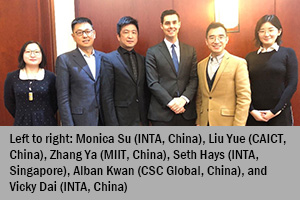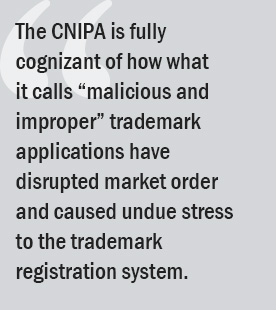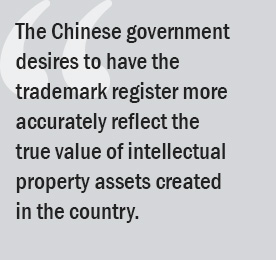INTA’s First Outreach on Digital Asia Underscores Benefit of Education on Global IP Governance Issues
Published: May 1, 2019
 As part of the Digital Asia Listening Tour 2019, INTA made its first outreach to the Chinese Ministry of Industry and Information Technology (MIIT) and its affiliated think tank, China Academy of Information and Communications Technology (CAICT), in Beijing, China.
As part of the Digital Asia Listening Tour 2019, INTA made its first outreach to the Chinese Ministry of Industry and Information Technology (MIIT) and its affiliated think tank, China Academy of Information and Communications Technology (CAICT), in Beijing, China.
The meeting, which took place March 20, was met with great enthusiasm by both the Chinese government and Internet-related stakeholders. Its success emphasizes strong interest from Chinese corporations to develop their knowledge and expertise, and to participate in global Internet governance issues.
At the meeting, INTA staff and CSC Global (Hong Kong) discussed with MIIT the General Data Protection Regulation (GDPR) repercussions of the WHOIS database, and its potential impact on brand owners. They also discussed the latest updates of China’s domain name policy, including Internet content provider (ICP) licensing and recordal regulations following the Measures of Domain Name Administration, which came into effect as of November 2017.
Participants included Zhang Ya, MIIT’s Deputy Director of Internet Division, Information & Telecommunication Administration, and Liu Yue, the Executive Director of CAICT.
Both MIIT and CAICT (a scientific research institute directly under MIIT) play vital roles in developing China’s policy on domain names and the Internet as a whole. China’s key government authorities for domain names and Internet policy include MIIT, which is responsible for the regulating IP addresses, domain names, and Internet policy; the Cyberspace Administration of China (CAC), which oversees data security and personal information protection; and the Ministry of Public Security (MPS), which covers enforcement actions and WHOIS information. In October, a Chinese delegation composed of MIIT, CAC, and Ministry of Foreign Affairs (MoA) will participate in the ICANN Montreal conference in Canada.
Repercussions of the WHOIS Database
MIIT touched upon the GDPR repercussions of the WHOIS database and its potential impact on brand owners in China and on Chinese-based websites. Industry sectors and governments may adopt different views and approaches to the GDPR regulation. However, the GDPR will probably not affect MIIT in terms of whose information is collected within the jurisdiction of China. At the same time, MIIT noted, it remains to be seen how GDPR will affect practice in China.
 From a regulatory perspective, MIIT requires all websites in China to comply with Chinese legislation and regulations, as well as to provide authentic name information. MIIT said it will continue to monitor ICANN policy for future trends.
From a regulatory perspective, MIIT requires all websites in China to comply with Chinese legislation and regulations, as well as to provide authentic name information. MIIT said it will continue to monitor ICANN policy for future trends.
China’s Domain Name Policy
MIIT went on to present an update on domain name policy. According to MIIT, Brand New generic top-level domains (gTLDs) are different from other commercial top-level domains (TLDs). Brand New gTLD registries still need to be accredited by MIIT first, but current restrictions are more relaxed compared with previous regulations, which required applicants to have a wholly owned foreign invested enterprise (WOFIE) in China.
In order to lower the access threshold for foreign TLDs entering the Chinese market, MIIT noted that it does not require financial association with foreign brand owners as long as a legitimate entity authorized on their behalf can operate and shoulder any liability for misconduct. CAICT echoed MIIT’s view that domain names are a relatively open area compared with other IP-related rights. MIIT suggested that entities such as CAICT might be better qualified than law firms to advise brand owners of government regulations, since it is in their best interest to streamline the process.
ICP License in China
MIIT raised the issue of ICP licenses for website operation within China. Whether an entity is located inside or outside free trade zones (FTZs) will determine if an ICP license is needed, as those within the FTZs enjoy more flexibility through the WOFIE model. MIIT gave details on specific requirements for foreign companies seeking a license.
According to China’s 2015 Classified Catalogue of Telecommunications Businesses, app stores, search engines, third-party platforms, and instant messaging sites will need to apply for ICP licenses. In these cases, a three-step process is required:
- Prior approval from the Department of Information Communication Development of MIIT;
- Provincial-level Ministry of Commerce approval; and
- Licensing by the Information & Telecommunication Administration of MIIT.
 Contrary to guidance from some Chinese Internet service providers and foreign consultants, MIIT confirmed that there is no restriction to obtain ICP license recordal using a foreign entity. MIIT further clarified that whether or not an online service requires an ICP license depends solely on whether the hosting server is based within China. MIIT stated that it will not forbid a website without an ICP license to conduct business in China.
Contrary to guidance from some Chinese Internet service providers and foreign consultants, MIIT confirmed that there is no restriction to obtain ICP license recordal using a foreign entity. MIIT further clarified that whether or not an online service requires an ICP license depends solely on whether the hosting server is based within China. MIIT stated that it will not forbid a website without an ICP license to conduct business in China.
However, due to a higher level of surveillance (which could slow down daily operations), foreign entities without ICP licensing still pose a risk to daily website operation. They also risk being blocked by certain service providers. While MIIT acknowledged these risks, they characterized this as a commercial issue, rather than a policy issue. In the end, MIIT emphasized that an ICP license is one of the conditions to help identify operators of infringing websites. MIIT noted that it would coordinate with other IP government departments in the follow-up measures of a website shutdown.
Concluding the event, MIIT expressed its support of INTA’s efforts to help Chinese companies gain more exposure to global Internet policies. Representatives of MIIT and CAICT noted that they are looking forward to attending INTA’s 2020 Annual Meeting in Singapore.
INTA’s China Representative Office based in Shanghai represents the Association’s 235 members in China. Working in collaboration with staff at INTA’s headquarters in New York City, the China Representative Office leads the Association’s policy, membership, marketing, and communications initiatives in these jurisdictions. To learn more about INTA’s activities in China, please contact INTA’s China Representative, Monica Su, at @[email protected] or Vicky Dai at [email protected].
Although every effort has been made to verify the accuracy of items in the INTA Bulletin, readers are urged to check independently on matters of specific concern or interest.
© 2019 International Trademark Association
This website uses cookies so that we can provide you with the best user experience possible. Cookie information is stored in your browser and performs functions such as recognising you when you return to our website and helping our team to understand which sections of the website you find most interesting and useful.
To find out more please see our Cookies Policy and Privacy Policy.
These cookies are used to identify a user’s browser as the visitor goes from page to page on the Site. These are session cookies, which means that the cookie is deleted when you leave the Site. It is an integral piece of the Site software and used to let the server know which users are on the Site at any given time and make certain parts of the Site easier to use.
|
|
If you disable this cookie, we will not be able to save your preferences. This means that every time you visit this website you will need to enable or disable cookies again.
These cookies are used to collect information about how visitors use our Site. The cookies collect information in anonymous form, including the numbers of visitors to the Site, where visitors have come to the Site from, the pages they visited and how they have interacted with tools on the Site like search and embedded media players. We use the information to compile statistical reports of our users’ browsing patterns so that we can improve the Site.
|
|
Please enable Functionality Cookies first so that we can save your preferences!
These cookies are used to deliver advertising relevant to the interests of visitors to our Site. They are persistent, which means they will remain on your device after you leave the Site.
- Facebook (Ad Pixel)
- Google (Ad Pixel)
- LinkedIn (Ad Pixel)
- Quattro Anonymous
Please enable Functionality Cookies first so that we can save your preferences!
